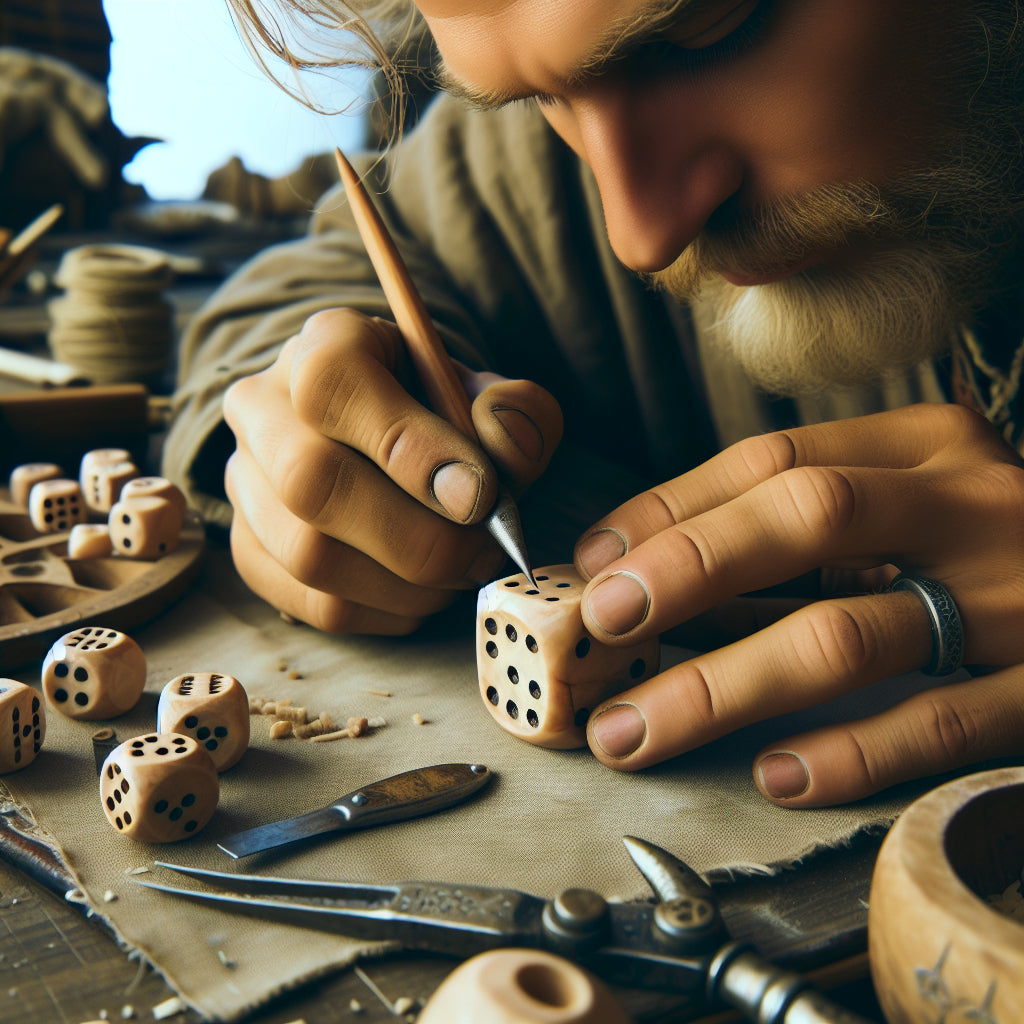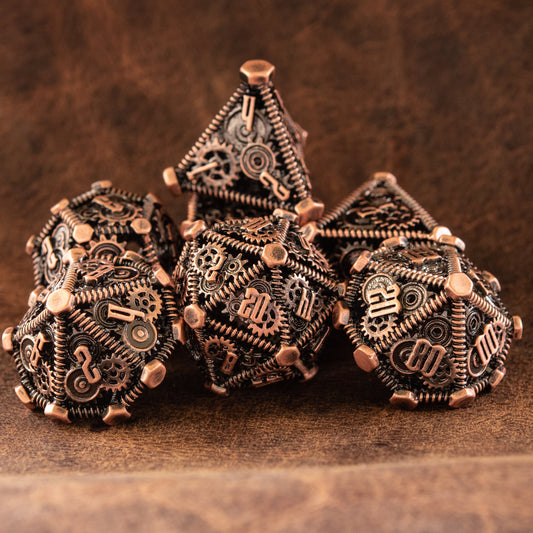The Origins and Evolution of Dice: A Journey Through Time
Introduction
Dice, one of the oldest gaming implements known to humanity, have a history that stretches back thousands of years. This article delves into the fascinating origins and evolution of dice, exploring their journey from ancient times to modern-day gaming.
The Ancient Beginnings of Dice
Early History
The earliest known dice were excavated from a site in modern-day Iran, dating back to the ancient Sumerians around 3000 BCE. These primitive dice were made from materials such as bone, ivory, and stone. The Sumerians, known for their advancements in writing and mathematics, likely used these dice in games of chance and divination. The cultural significance of dice in these early times is evident, as they were integral to both entertainment and spiritual practices.
Dice in Ancient Civilizations
Egyptians
The Egyptians created knucklebones and used them in a game similar to jacks. These knucklebones were typically made from the ankle bones of hoofed animals. The use of knucklebones in games highlights the resourcefulness of ancient cultures in utilizing available materials for entertainment.
Greeks
The Greeks are often credited with inventing the six-sided die, or "hexahedron," and standardizing the shape and numbering system that we still use today. Dice held significant cultural importance in Greek society, being used in various games and rituals. The Greeks' contribution to the development of dice was pivotal in shaping the future of gaming.
Romans
In ancient Rome, dice games were immensely popular among all social classes. Roman dice were typically made from bone, metal, and sometimes glass. The Romans even had a god of dice named Mercury, underscoring the cultural significance of these small cubes. The widespread use of dice in Roman society is well-documented in literature and historical records.
Knucklebones
The ancient ancestor of the modern die is the knucklebone, or astragal, sourced from the ankle bones of hoofed animals. Initially used for fortune-telling, knucklebones later became a popular gaming tool in various early cultures, including the Egyptians, Mayans, and Native Americans. The transition from divination to gaming illustrates the evolving role of dice in human history.
Dice in Medieval and Renaissance Periods
Cultural Impact
During the medieval and renaissance periods, dice games were often discouraged or banned in societies that sought to stamp out immorality. Despite these restrictions, dice continued to be a popular pastime. References in literature and historical records from these eras provide insight into the ongoing appeal of dice games, even in the face of societal disapproval.
Gambling and Games
Dice continued to be used extensively in gambling and games throughout the medieval and renaissance periods. One notable example is the game of Hazard, a precursor to modern craps. The enduring popularity of dice games during these times is a testament to their entertainment value and the human fascination with chance and risk.
Conclusion
From ancient Sumerians to modern-day gamers, dice have played a crucial role in human history. Whether you're a seasoned veteran or a newcomer to tabletop gaming, the legacy of dice continues to offer endless possibilities for fun and adventure.
The Modern Evolution of Dice
Mass Production and Standardization
The industrial revolution marked a significant turning point in the history of dice. With the advent of mass production, dice became more standardized and widely available to the general public. Prior to this, dice were often handcrafted, leading to variations in size, shape, and fairness. The introduction of materials like plastic and resin revolutionized the manufacturing process, allowing for the creation of precise and uniform dice.
- Materials Used: Plastic, Resin
- Impact: Greater standardization, widespread availability
The standardization of dice ensured that they were fair and reliable, which was crucial for both casual gamers and serious enthusiasts. This development paved the way for the modern gaming industry, where dice play a central role in various types of games.
Role-Playing Games (RPGs)
The 1970s witnessed a monumental shift in the use of dice with the introduction of role-playing games (RPGs). Among these, Dungeons & Dragons (D&D) stands out as a revolutionary force that transformed the landscape of tabletop gaming.
Dungeons & Dragons
Dungeons & Dragons, created by Gary Gygax and Dave Arneson, introduced a new dimension to dice usage. Unlike traditional board games, D&D utilized a variety of polyhedral dice to determine the outcomes of actions and events within the game. This innovative approach added depth and complexity to gameplay, making it more immersive and engaging.
- Types of Dice Used: d4, d6, d8, d10, d12, d20
- Impact on Gaming: Central to gameplay mechanics, determining outcomes of actions and events
The success of D&D popularized the use of polyhedral dice, which are now a staple in the RPG genre. The game's reliance on dice for determining character actions, combat outcomes, and story progression has made these small, numbered objects an indispensable part of the RPG experience.
Other RPGs
The influence of Dungeons & Dragons extended beyond its own franchise, inspiring a multitude of other RPGs that also utilize different types of dice for gameplay. Games like Pathfinder, Shadowrun, and Call of Cthulhu have adopted and adapted the use of polyhedral dice, each bringing their unique twist to the mechanics and storytelling aspects.
- Examples: Pathfinder, Shadowrun, Call of Cthulhu
- Dice Usage: Varies based on game mechanics and rules
The diverse use of dice in these games demonstrates their versatility and enduring appeal. Whether it's rolling a d20 for a critical hit or using percentile dice to determine success rates, dice remain a core component of the RPG experience.
Dice in Popular Culture and Technology
Board Games and Casinos
Dice have maintained their popularity in both board games and casinos, captivating people of all ages with their simplicity and potential for excitement. Classic board games like Monopoly and Yahtzee rely heavily on dice rolls to drive gameplay and create unpredictable outcomes.
- Examples: Monopoly, Yahtzee, Risk
- Role: Determining movement, scoring, and game progression
In the realm of gambling, dice games like Craps continue to attract players with the thrill of chance and the possibility of winning big. The tactile experience of rolling dice and the suspense of waiting for the outcome make these games enduring favorites in casinos worldwide.
Digital Dice
The advent of digital technology has brought dice into the virtual realm, expanding their reach and versatility. Online role-playing games (RPGs) and mobile apps now incorporate digital dice, allowing players to experience the randomness and excitement of dice rolls without the need for physical dice.
- Examples: Online RPGs, Mobile apps
- Benefits: Convenience, accessibility, integration with digital platforms
Digital dice have made it easier for people to engage in gaming experiences regardless of their location. They also offer additional features such as automated calculations and complex probability algorithms, enhancing the overall gaming experience.
Conclusion
From ancient Sumerians to modern-day gamers, dice have played a crucial role in human history. Their journey from primitive knucklebones to sophisticated polyhedral shapes reflects the evolution of human ingenuity and the enduring appeal of games of chance and skill.
Whether you're a seasoned veteran or a newcomer to tabletop gaming, the legacy of dice continues to offer endless possibilities for fun and adventure. As technology advances and new gaming genres emerge, dice will undoubtedly remain a beloved and integral part of the gaming world.
So, the next time you roll a die, take a moment to appreciate its rich history and the countless hours of entertainment it has provided throughout the ages. Embrace the thrill of chance, and let the dice lead you on your next great adventure.






